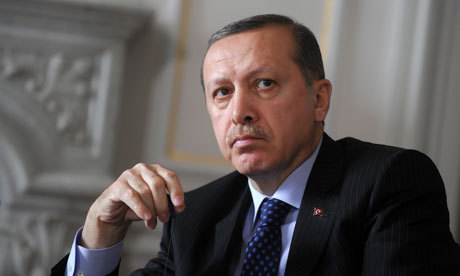UPDATE as of Sunday, July 26: Far from my early skepticism, the Turkish Government has embraced a complete, 180-degree turn in its ISIL policy over the last 48 hours. The Turkish Air Force has conducted at least 3 rounds of air strikes on ISIL checkpoints and storage areas across the border in northern Syria, and Turkish planes have been bombing PKK locations in the Qandil Mountains located in Iraqi Kurdistan. The Turkish Foreign Ministry, Prime Minister Davutoglu, and President Erdogan have all said that these operations will continue for as long as it's necessary to provide safety and security to the Turkish people in what has been a bruising week of suicide bombings and shootings along the country's southern border with Syria. Even so, Turkey has remained relatively restrained in its retaliation, particularly when compared to the Jordanians, who authorized dozens upon dozens of air raids against ISIL after the burning alive of Jordanian Air Force Captain Muath Al-Kassasbeh by ISIL militants in a video taped killing.
__________
Before the United States dispatched its F-15's and F-16's over the skies of Iraq and Syria last fall, the administration worked furiously behind the scenes to assemble an anti-ISIL coalition that would prove durable. Retired General John Allen, the former U.S. commander in Afghanistan, State Department officials, personnel on the National Security Council, and President Barack Obama himself lobbied Arabs and Europeans intensely to not only help with the campaign, but to take an aggressive role in the kinetic activity. Although U.S. pilots have dropped most of the ordnance and have flown most of the sorties against ISIL targets, the U.K. Canada, Jordan, Saudi Arabia, Qatar, the UAE, Bahrain, France, the Netherlands, and several other countries are participating in the airstrikes as well. Getting regional buy-in, therefore, was a top administration priority.
Turkey, however, was a far more hesitant and difficult state to deal with. Unfortunately, Turkey was also the country where the vast majority of foreign fighters used to reach ISIL or Jabhat al-Nusra. With ISIL alone boasting tens of thousands of foreign fighters in its ranks, it would be a safe bet that thousands of those fighters traversed Turkey and eventually crossed the Turkish-Syrian border.
This is not to say that the Turkish Government has not been helpful in some areas. Ankara has allowed the United States Air Force to base surveillance, reconnaissance, and intelligence operations in Incirlik air base -- information that has no doubt helped U.S. and coalition pilots assemble a pattern on ISIL's ground maneuvers and tactics. Yet even so, Turkish authorities refused to permit the U.S. to use armed aircraft from Turkish soil on bombing missions in Syria and Iraq.
That all changed on Thursday, July 23. After nine months of cajoling and negotiation, the Turkish Government has now agreed to host armed U.S. drones and manned aircraft devoted exclusively for the anti-ISIL campaign (a decision subsequently confirmed by Turkish President Recep Tayyip Erdogan). In describing the move, a U.S. official called it a "game changer."
U.S. officials are calling this a game changer for a reason. Here's why:
1) Incirlik, where the manned bombers and fighter aircraft will take off, is a lot closer to ISIL's territory in Syria than U.S. aircraft carriers in the Persian Gulf or U.S. air bases in the Gulf sheikdoms. Incirlik, in the Turkish province of Adana, is less than 300 miles from ISIL's headquarters in Raqqah. That is a lot closer to the heart of ISIL command-and-control than al-Udeid in Qatar or al-Dhafra in the United Arab Emirates, where most of the U.S. sorties originate from. In other words, U.S. aircraft will save time and distance to a target and will burn a lot less fuel to get there. With fuel less fuel burnt in transit, the more that is available for U.S. pilots to survey the scene and look for targets. Aircraft will be able to respond far more quickly to contingencies or emergency situations on the ground, and could theoretically increase the tempo of the air campaign.
2) Turkey now appears to recognize that the Islamic State is as much of a threat to their national security as any Kurdish faction could be. Or, if that declaration is too hopeful, President Erdogan are at the least now cognizant of the fact that Turkey cannot afford to sit on the sidelines any longer. The suicide bombing on a Turkish cultural center in Suruc that killed 32 people, the gunfight between Turkish troops and ISIL militants along the border, and the netting of dozens of ISIL collaborators, sympathizers, and suspects in Ankara are forcing the Turks' hands to get more involved and proactive.
3) Could these new developments point to a Turkey that is now more willing to be a partner against ISIL, akin to the UAE's and Jordan's of the world? Depending on how you interpret the late-night July 24 Turkish airstrike on ISIL positions along the border, the answer could be yes (Turkey, after all, hasn't used its Air Force to bomb ISIL at all prior to that operation). If you take a more skeptical and proportional approach (as I do), the opening of Incirlik to manned bombers and fighters may be all that we can hope for. Even so, retaliation on ISIL militants -- even if isolated -- is still more than what Ankara has done in the past.
Turkey has chosen to get into the game. The question now in the minds of U.S. officials is whether this is the extent of Turkish involvement, or whether opening up Incirlik is the first stage along a continuum of even greater engagement from Erdogan and his government.

